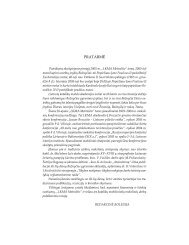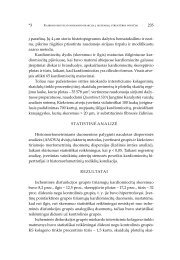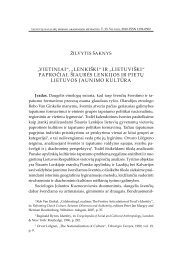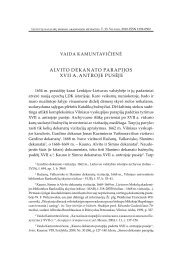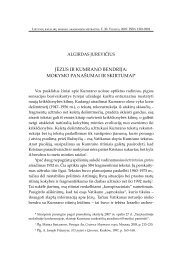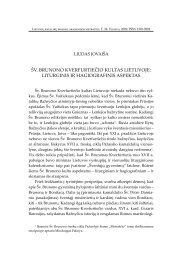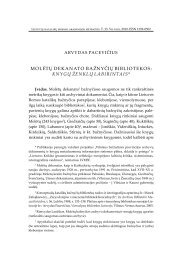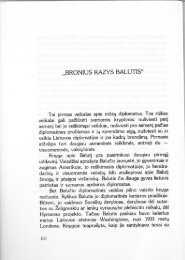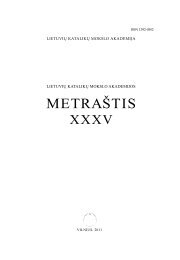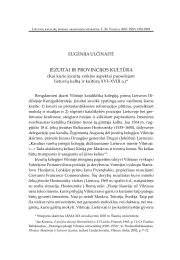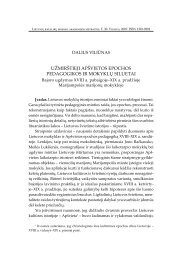- Page 1 and 2:
3 PRATARMö Šis „LKMA Metraštis
- Page 3 and 4:
5 LIETUVIŲ KATALIKŲ MOKSLO AKADEM
- Page 5 and 6:
*3 TURINYS 7 DR. VILMA ŽALTAUSKAIT
- Page 7 and 8:
*5 TURINYS 9 HABIL. DR. ONA TIJŪN
- Page 9:
Moksliniai straipsniai
- Page 12 and 13:
14 11.00 Pertrauka KONFERENCIJA „
- Page 14 and 15:
16 KONFERENCIJA „VYSKUPAS ANTANAS
- Page 16 and 17:
18 VYSK. DR. JONAS BORUTA, SJ *2 ti
- Page 18 and 19:
20 VYSK. DR. JONAS BORUTA, SJ *4 Gr
- Page 20 and 21:
22 VYSK. DR. JONAS BORUTA, SJ *6 Re
- Page 22 and 23:
24 VYSK. DR. JONAS BORUTA, SJ *8 Ta
- Page 24 and 25:
26 DR. VYTAUTAS JOGöLA *2 Tačiau
- Page 26 and 27:
28 DR. VYTAUTAS JOGöLA *4 mokymo i
- Page 28 and 29:
30 DR. VYTAUTAS JOGöLA *6 pažyma
- Page 30 and 31:
32 DR. VYTAUTAS JOGöLA *8 Šias pa
- Page 32 and 33:
34 DR. VYTAUTAS JOGöLA *10 tą ši
- Page 34 and 35:
36 HABIL. DR. JONAS KUBILIUS *2
- Page 36 and 37:
38 HABIL. DR. JONAS KUBILIUS *4
- Page 38 and 39:
40 HABIL. DR. JONAS KUBILIUS *6
- Page 40 and 41:
42 HABIL. DR. JONAS KUBILIUS *8
- Page 42 and 43:
44 HABIL. DR. JONAS KUBILIUS *10
- Page 44 and 45:
46 HABIL. DR. JONAS KUBILIUS *12
- Page 46 and 47:
48 HABIL. DR. JONAS KUBILIUS *14
- Page 48 and 49:
50 HABIL. DR. JONAS KUBILIUS *16
- Page 50 and 51:
52 HABIL. DR. JONAS KUBILIUS *18
- Page 52 and 53:
54 HABIL. DR. JONAS KUBILIUS *20
- Page 54 and 55:
56 HABIL. DR. VANDA ŽEKONIENö *2
- Page 56 and 57:
58 HABIL. DR. VANDA ŽEKONIENö *4
- Page 58 and 59:
60 HABIL. DR. VANDA ŽEKONIENö *6
- Page 60 and 61:
62 DR. KAZIMIERAS GARŠVA *2 dukuot
- Page 62 and 63:
64 DR. KAZIMIERAS GARŠVA *4 tiek a
- Page 64 and 65:
66 DR. KAZIMIERAS GARŠVA *6 niai -
- Page 66 and 67:
68 DR. KAZIMIERAS GARŠVA *8 Žodž
- Page 68 and 69:
70 DR. DALIA ČIOČYTö *2 Cituotam
- Page 70 and 71:
72 DR. DALIA ČIOČYTö *4 Poema
- Page 72 and 73:
74 DR. DALIA ČIOČYTö *6 Poetin÷
- Page 74 and 75:
76 DR. DALIA ČIOČYTö *8 kiek Die
- Page 76 and 77:
78 DR. VYTAUTAS BERENIS *2 vertinam
- Page 78 and 79:
80 DR. VYTAUTAS BERENIS *4 yra steb
- Page 80 and 81:
82 DR. VYTAUTAS BERENIS *6 ma tuo p
- Page 82 and 83:
84 DR. VYTAUTAS BERENIS *8 raidą n
- Page 85 and 86:
87 LIETUVIŲ KATALIKŲ MOKSLO AKADE
- Page 87 and 88:
*3 ANTANO BARANAUSKO KRIKŠČIONIŠ
- Page 89 and 90:
*5 ANTANO BARANAUSKO KRIKŠČIONIŠ
- Page 91 and 92:
*7 ANTANO BARANAUSKO KRIKŠČIONIŠ
- Page 93 and 94:
*9 ANTANO BARANAUSKO KRIKŠČIONIŠ
- Page 95 and 96:
*11 ANTANO BARANAUSKO KRIKŠČIONI
- Page 97:
*13 ANTANO BARANAUSKO KRIKŠČIONI
- Page 100 and 101:
102 DR. PAULIUS SUBAČIUS *2 Pasiri
- Page 102 and 103:
104 DR. PAULIUS SUBAČIUS *4 kokie
- Page 104 and 105:
106 DR. PAULIUS SUBAČIUS *6 vadina
- Page 106 and 107:
108 DR. PAULIUS SUBAČIUS *8 lą -
- Page 108 and 109:
110 DR. PAULIUS SUBAČIUS *10 EUROP
- Page 110 and 111:
112 DR. ROMA BONČKUTö *2 tūros.
- Page 112 and 113:
114 DR. ROMA BONČKUTö *4 XIX a. p
- Page 114 and 115:
116 DR. ROMA BONČKUTö *6 Tuo laik
- Page 116 and 117:
118 DR. ROMA BONČKUTö *8 Miškas
- Page 118 and 119:
120 DR. ROMA BONČKUTö *10 Poetai
- Page 120 and 121:
122 DR. ROMA BONČKUTö *12 Dažnia
- Page 122 and 123:
124 DR. ROMA BONČKUTö *14 Sudiev,
- Page 124 and 125:
126 DR. ROMA BONČKUTö *16 ANCIENT
- Page 126 and 127:
128 HABIL. DR. EGIDIJUS ALEKSANDRAV
- Page 128 and 129:
130 HABIL. DR. EGIDIJUS ALEKSANDRAV
- Page 130 and 131:
132 HABIL. DR. EGIDIJUS ALEKSANDRAV
- Page 133 and 134:
LIETUVIŲ KATALIKŲ MOKSLO AKADEMIJ
- Page 135 and 136:
*3 ANTANAS BARANAUSKAS - NESUPRASTA
- Page 137 and 138:
*5 ANTANAS BARANAUSKAS - NESUPRASTA
- Page 139 and 140:
LIETUVIŲ KATALIKŲ MOKSLO AKADEMIJ
- Page 141 and 142:
*3 ANTANAS BARANAUSKAS IR KATALIKI
- Page 143 and 144:
*5 ANTANAS BARANAUSKAS IR KATALIKI
- Page 145 and 146:
*7 ANTANAS BARANAUSKAS IR KATALIKI
- Page 147 and 148:
*9 ANTANAS BARANAUSKAS IR KATALIKI
- Page 149 and 150:
*11 ANTANAS BARANAUSKAS IR KATALIKI
- Page 151 and 152:
*13 ANTANAS BARANAUSKAS IR KATALIKI
- Page 153 and 154:
*15 ANTANAS BARANAUSKAS IR KATALIKI
- Page 155 and 156:
LIETUVIŲ KATALIKŲ MOKSLO AKADEMIJ
- Page 157 and 158:
*3 KOKIA KALBA MOKYTI BALTARUSIUS K
- Page 159 and 160:
*5 KOKIA KALBA MOKYTI BALTARUSIUS K
- Page 161 and 162:
*7 KOKIA KALBA MOKYTI BALTARUSIUS K
- Page 163 and 164:
*9 KOKIA KALBA MOKYTI BALTARUSIUS K
- Page 165 and 166:
*11 KOKIA KALBA MOKYTI BALTARUSIUS
- Page 167:
*13 KOKIA KALBA MOKYTI BALTARUSIUS
- Page 170 and 171:
172 DR. KRZYSZTOF BUCHOWSKI *2 Sejn
- Page 172 and 173:
174 DR. KRZYSZTOF BUCHOWSKI *4 Anta
- Page 174 and 175:
176 DR. KRZYSZTOF BUCHOWSKI *6 Wed
- Page 176 and 177:
178 DR. KRZYSZTOF BUCHOWSKI *8 uda
- Page 178 and 179:
180 DR. KRZYSZTOF BUCHOWSKI *10 gac
- Page 180 and 181:
182 DR. KRZYSZTOF BUCHOWSKI *12 win
- Page 182 and 183:
184 DR. KRZYSZTOF BUCHOWSKI *14 Sej
- Page 184 and 185:
186 DR. KRZYSZTOF BUCHOWSKI *16 W 1
- Page 186 and 187:
188 DR. KRZYSZTOF BUCHOWSKI *18 kad
- Page 188 and 189:
190 DR. KRZYSZTOF BUCHOWSKI *20 tha
- Page 190 and 191:
192 KUN. PROF. TADEUSZ KRAHEL *2 pa
- Page 192 and 193:
194 KUN. PROF. TADEUSZ KRAHEL *4 wi
- Page 194 and 195: 196 KUN. PROF. TADEUSZ KRAHEL *6 ni
- Page 196 and 197: 198 KUN. PROF. TADEUSZ KRAHEL *8 dy
- Page 198 and 199: 200 KUN. PROF. TADEUSZ KRAHEL *10 K
- Page 200 and 201: 202 KUN. PROF. TADEUSZ KRAHEL *12 k
- Page 202 and 203: 204 KUN. PROF. TADEUSZ KRAHEL *14 n
- Page 204 and 205: 206 KUN. PROF. TADEUSZ KRAHEL *16 R
- Page 206 and 207: 208 KUN. PROF. TADEUSZ KRAHEL *18 u
- Page 208 and 209: 210 KUN. PROF. TADEUSZ KRAHEL *20 J
- Page 210 and 211: 212 KUN. PROF. TADEUSZ KRAHEL *22 n
- Page 212 and 213: 214 DR. VILMA ŽALTAUSKAITö *2 Vad
- Page 214 and 215: 216 DR. VILMA ŽALTAUSKAITö *4 kat
- Page 216 and 217: 218 DR. VILMA ŽALTAUSKAITö *6 Bej
- Page 218 and 219: 220 DR. VILMA ŽALTAUSKAITö *8 mon
- Page 220 and 221: 222 DR. VILMA ŽALTAUSKAITö *10 kr
- Page 222 and 223: 224 DR. VILMA ŽALTAUSKAITö *12 Ja
- Page 224 and 225: 226 DR. VILMA ŽALTAUSKAITö *14 ku
- Page 226 and 227: 228 DR. VILMA ŽALTAUSKAITö *16 wa
- Page 228 and 229: 230 MOKSLINö KONFERENCIJA „LIETU
- Page 230 and 231: 232 MOKSLINö KONFERENCIJA „LIETU
- Page 232 and 233: 234 MOKSLINö KONFERENCIJA „LIETU
- Page 234 and 235: 236 MOKSLINö KONFERENCIJA „LIETU
- Page 236 and 237: 238 MOKSLINö KONFERENCIJA „LIETU
- Page 238 and 239: 240 SVEIKINIMAI *2 Šiais metais mi
- Page 240 and 241: 242 SVEIKINIMAI *4 ti Katalikų Ba
- Page 242 and 243: LIETUVIŲ KATALIKŲ MOKSLO AKADEMIJ
- Page 246 and 247: 248 JEAN-LOUIS TAURAN *5 her said:
- Page 248 and 249: 250 JEAN-LOUIS TAURAN *7 which migh
- Page 250 and 251: 252 JEAN-LOUIS TAURAN *9 ro, sprend
- Page 252 and 253: 254 KAZYS LOZORAITIS *2 rą laim÷j
- Page 254 and 255: 256 KAZYS LOZORAITIS *4 Kaipgi šia
- Page 256 and 257: 258 VYSK. DR. JONAS BORUTA, SJ *2 K
- Page 258 and 259: 260 VYSK. DR. JONAS BORUTA, SJ *4 V
- Page 260 and 261: 262 VYSK. DR. JONAS BORUTA, SJ *6 g
- Page 262 and 263: 264 VYSK. DR. JONAS BORUTA, SJ *8
- Page 264 and 265: 266 VYSK. DR. JONAS BORUTA, SJ *10
- Page 266 and 267: 268 VYSK. DR. JONAS BORUTA, SJ *12
- Page 268 and 269: 270 VYSK. DR. JONAS BORUTA, SJ *14
- Page 270 and 271: 272 VYSK. DR. JONAS BORUTA, SJ *16
- Page 272 and 273: 274 VYSK. DR. JONAS BORUTA, SJ *18
- Page 275 and 276: LIETUVIŲ KATALIKŲ MOKSLO AKADEMIJ
- Page 277 and 278: *3 KĄ XX A. PRADŽIOJE VATIKANAS
- Page 279 and 280: *5 KĄ XX A. PRADŽIOJE VATIKANAS
- Page 281 and 282: *7 KĄ XX A. PRADŽIOJE VATIKANAS
- Page 283 and 284: *9 KĄ XX A. PRADŽIOJE VATIKANAS
- Page 285 and 286: LIETUVIŲ KATALIKŲ MOKSLO AKADEMIJ
- Page 287 and 288: *3 LIETUVA IR VATIKANAS PIRMOJO PAS
- Page 289 and 290: *5 LIETUVA IR VATIKANAS PIRMOJO PAS
- Page 291 and 292: *7 LIETUVA IR VATIKANAS PIRMOJO PAS
- Page 293 and 294: LIETUVIŲ KATALIKŲ MOKSLO AKADEMIJ
- Page 295 and 296:
*3 LIETUVOS IR VATIKANO SANTYKIAI,
- Page 297 and 298:
*5 LIETUVOS IR VATIKANO SANTYKIAI,
- Page 299 and 300:
*7 LIETUVOS IR VATIKANO SANTYKIAI,
- Page 301 and 302:
*9 LIETUVOS IR VATIKANO SANTYKIAI,
- Page 303 and 304:
*11 LIETUVOS IR VATIKANO SANTYKIAI,
- Page 305 and 306:
*13 LIETUVOS IR VATIKANO SANTYKIAI,
- Page 307 and 308:
*15 LIETUVOS IR VATIKANO SANTYKIAI,
- Page 309 and 310:
*17 LIETUVOS IR VATIKANO SANTYKIAI,
- Page 311 and 312:
*19 LIETUVOS IR VATIKANO SANTYKIAI,
- Page 313 and 314:
*21 LIETUVOS IR VATIKANO SANTYKIAI,
- Page 315 and 316:
*23 LIETUVOS IR VATIKANO SANTYKIAI,
- Page 317 and 318:
*25 LIETUVOS IR VATIKANO SANTYKIAI,
- Page 319 and 320:
*27 LIETUVOS IR VATIKANO SANTYKIAI,
- Page 321 and 322:
*29 LIETUVOS IR VATIKANO SANTYKIAI,
- Page 323 and 324:
*31 LIETUVOS IR VATIKANO SANTYKIAI,
- Page 325 and 326:
*33 LIETUVOS IR VATIKANO SANTYKIAI,
- Page 327 and 328:
*35 LIETUVOS IR VATIKANO SANTYKIAI,
- Page 329 and 330:
*37 LIETUVOS IR VATIKANO SANTYKIAI,
- Page 331 and 332:
*39 LIETUVOS IR VATIKANO SANTYKIAI,
- Page 333 and 334:
*41 LIETUVOS IR VATIKANO SANTYKIAI,
- Page 335 and 336:
*43 LIETUVOS IR VATIKANO SANTYKIAI,
- Page 337 and 338:
*45 LIETUVOS IR VATIKANO SANTYKIAI,
- Page 339 and 340:
*47 LIETUVOS IR VATIKANO SANTYKIAI,
- Page 341 and 342:
*49 LIETUVOS IR VATIKANO SANTYKIAI,
- Page 343 and 344:
*51 LIETUVOS IR VATIKANO SANTYKIAI,
- Page 345 and 346:
*53 LIETUVOS IR VATIKANO SANTYKIAI,
- Page 347 and 348:
*55 LIETUVOS IR VATIKANO SANTYKIAI,
- Page 349 and 350:
*57 LIETUVOS IR VATIKANO SANTYKIAI,
- Page 351 and 352:
*59 LIETUVOS IR VATIKANO SANTYKIAI,
- Page 353 and 354:
*61 LIETUVOS IR VATIKANO SANTYKIAI,
- Page 355 and 356:
*63 LIETUVOS IR VATIKANO SANTYKIAI,
- Page 357 and 358:
*65 LIETUVOS IR VATIKANO SANTYKIAI,
- Page 359 and 360:
*67 LIETUVOS IR VATIKANO SANTYKIAI,
- Page 361 and 362:
*69 LIETUVOS IR VATIKANO SANTYKIAI,
- Page 363 and 364:
*71 LIETUVOS IR VATIKANO SANTYKIAI,
- Page 365 and 366:
*73 LIETUVOS IR VATIKANO SANTYKIAI,
- Page 367 and 368:
*75 LIETUVOS IR VATIKANO SANTYKIAI,
- Page 369 and 370:
*77 LIETUVOS IR VATIKANO SANTYKIAI,
- Page 371 and 372:
*79 LIETUVOS IR VATIKANO SANTYKIAI,
- Page 373 and 374:
*81 LIETUVOS IR VATIKANO SANTYKIAI,
- Page 375 and 376:
*83 LIETUVOS IR VATIKANO SANTYKIAI,
- Page 377:
*85 LIETUVOS IR VATIKANO SANTYKIAI,
- Page 380 and 381:
382 DR. REGINA LAUKAITYTö *2 proje
- Page 382 and 383:
384 DR. REGINA LAUKAITYTö *4 par÷
- Page 384 and 385:
386 DR. REGINA LAUKAITYTö *6 kojan
- Page 386 and 387:
388 DR. REGINA LAUKAITYTö *8 uolum
- Page 389 and 390:
LIETUVIŲ KATALIKŲ MOKSLO AKADEMIJ
- Page 391 and 392:
*3 SSRS-VATIKANO SANTYKIAI IR KATAL
- Page 393 and 394:
*5 SSRS-VATIKANO SANTYKIAI IR KATAL
- Page 395:
*7 SSRS-VATIKANO SANTYKIAI IR KATAL
- Page 398 and 399:
400 DR. PAULIUS SUBAČIUS *2 tarpva
- Page 400 and 401:
402 DR. PAULIUS SUBAČIUS *4 Su ben
- Page 402 and 403:
404 DR. PAULIUS SUBAČIUS *6 PUBLIC
- Page 404 and 405:
406 TARPTAUTINIS SEMINARAS „KRIK
- Page 406 and 407:
408 ANDRIUS MARCINKEVIČIUS *2 kių
- Page 408 and 409:
410 ANDRIUS MARCINKEVIČIUS *4 Kaun
- Page 411 and 412:
LIETUVIŲ KATALIKŲ MOKSLO AKADEMIJ
- Page 413 and 414:
*3 KATALIKŲ BAŽNYČIA LIETUVOJE 1
- Page 415 and 416:
LIETUVIŲ KATALIKŲ MOKSLO AKADEMIJ
- Page 417 and 418:
*3 THE BIRTH OF THE NATIONAL CHURCH
- Page 419 and 420:
*5 THE BIRTH OF THE NATIONAL CHURCH
- Page 421 and 422:
*7 THE BIRTH OF THE NATIONAL CHURCH
- Page 423 and 424:
LIETUVIŲ KATALIKŲ MOKSLO AKADEMIJ
- Page 425 and 426:
*3 THE RESEARCH ABOUT THE CONTEMPOR
- Page 427 and 428:
LIETUVIŲ KATALIKŲ MOKSLO AKADEMIJ
- Page 429 and 430:
*3 THE PROCESS AND THE REASONS OF C
- Page 431 and 432:
*5 THE PROCESS AND THE REASONS OF C
- Page 433 and 434:
*7 THE PROCESS AND THE REASONS OF C
- Page 435:
Į v a i r ū s s t r a i p s n i a
- Page 438 and 439:
440 AKAD. HABIL. DR. SOFIJA KANOPKA
- Page 440 and 441:
442 AKAD. HABIL. DR. SOFIJA KANOPKA
- Page 442 and 443:
444 AKAD. HABIL. DR. SOFIJA KANOPKA
- Page 444 and 445:
446 AKAD. HABIL. DR. SOFIJA KANOPKA
- Page 446 and 447:
448 AKAD. HABIL. DR. SOFIJA KANOPKA
- Page 448 and 449:
450 AKAD. HABIL. DR. SOFIJA KANOPKA
- Page 450 and 451:
452 AKAD. HABIL. DR. SOFIJA KANOPKA
- Page 453 and 454:
LIETUVIŲ KATALIKŲ MOKSLO AKADEMIJ
- Page 455 and 456:
*3 DŽIAUGSMAS - KATALIKO DVASINIO
- Page 457 and 458:
*5 DŽIAUGSMAS - KATALIKO DVASINIO
- Page 459 and 460:
*7 DŽIAUGSMAS - KATALIKO DVASINIO
- Page 461 and 462:
*9 DŽIAUGSMAS - KATALIKO DVASINIO
- Page 463 and 464:
*11 DŽIAUGSMAS - KATALIKO DVASINIO
- Page 465 and 466:
*13 DŽIAUGSMAS - KATALIKO DVASINIO
- Page 467 and 468:
*15 DŽIAUGSMAS - KATALIKO DVASINIO
- Page 469 and 470:
*17 DŽIAUGSMAS - KATALIKO DVASINIO
- Page 471 and 472:
*19 DŽIAUGSMAS - KATALIKO DVASINIO
- Page 473 and 474:
*21 DŽIAUGSMAS - KATALIKO DVASINIO
- Page 475 and 476:
*23 DŽIAUGSMAS - KATALIKO DVASINIO
- Page 477 and 478:
LIETUVIŲ KATALIKŲ MOKSLO AKADEMIJ
- Page 479 and 480:
*3 AKIVAIZDŪS IR UŽSLöPTI ORGANI
- Page 481 and 482:
*5 AKIVAIZDŪS IR UŽSLöPTI ORGANI
- Page 483 and 484:
*7 AKIVAIZDŪS IR UŽSLöPTI ORGANI
- Page 485 and 486:
*9 AKIVAIZDŪS IR UŽSLöPTI ORGANI
- Page 487 and 488:
*11 AKIVAIZDŪS IR UŽSLöPTI ORGAN
- Page 489 and 490:
*13 AKIVAIZDŪS IR UŽSLöPTI ORGAN
- Page 491 and 492:
*15 AKIVAIZDŪS IR UŽSLöPTI ORGAN
- Page 493 and 494:
*17 AKIVAIZDŪS IR UŽSLöPTI ORGAN
- Page 495 and 496:
*19 AKIVAIZDŪS IR UŽSLöPTI ORGAN
- Page 497:
P u b l i k a c i j o s
- Page 500 and 501:
502 KUN. LIC. VACLOVAS ALIULIS, MIC
- Page 502 and 503:
504 KUN. LIC. VACLOVAS ALIULIS, MIC
- Page 504 and 505:
506 KUN. LIC. VACLOVAS ALIULIS, MIC
- Page 506 and 507:
508 KUN. LIC. VACLOVAS ALIULIS, MIC
- Page 508 and 509:
510 KUN. LIC. VACLOVAS ALIULIS, MIC
- Page 510 and 511:
LIETUVIŲ KATALIKŲ MOKSLO AKADEMIJ
- Page 512 and 513:
514 JURGIS *3 lašui varvina savo n
- Page 514 and 515:
516 JURGIS *5 Pereikime prie social
- Page 516 and 517:
518 JURGIS *7 buvo pavertę. Jie ai
- Page 518 and 519:
520 JURGIS *9 Ir teip jei t÷vyn÷s
- Page 520 and 521:
522 JURGIS *11 T÷vai išsigimę, b
- Page 522 and 523:
524 JURGIS *13 mūsų kalba neišdi
- Page 524 and 525:
526 JURGIS *15 Migsi teisingo sapnu
- Page 526 and 527:
528 JURGIS *17 Priešas, nor÷damas
- Page 528 and 529:
530 JURGIS *19 kad neprider niekint
- Page 530 and 531:
532 JURGIS *21 * * * Kalb÷damas ap
- Page 532 and 533:
534 VYSK. DR. JONAS BORUTA, SJ *2 r
- Page 534 and 535:
536 VYSK. DR. JONAS BORUTA, SJ *4 i
- Page 536 and 537:
538 MONS. KAN. K.GAŠČIŪNAS *2 pr
- Page 538 and 539:
540 MONS. KAN. K.GAŠČIŪNAS *4 su
- Page 540 and 541:
542 MONS. KAN. K.GAŠČIŪNAS *6 li
- Page 542 and 543:
544 MONS. KAN. K.GAŠČIŪNAS *8 ga
- Page 544 and 545:
546 MONS. KAN. K.GAŠČIŪNAS *10 p
- Page 546 and 547:
548 MONS. KAN. K.GAŠČIŪNAS *12 t
- Page 548 and 549:
550 MONS. KAN. K.GAŠČIŪNAS *14 D
- Page 550 and 551:
552 MONS. KAN. K.GAŠČIŪNAS *16 t
- Page 552 and 553:
554 MONS. KAN. K.GAŠČIŪNAS *18 t
- Page 554 and 555:
556 MONS. KAN. K.GAŠČIŪNAS *20 K
- Page 556 and 557:
558 MONS. KAN. K.GAŠČIŪNAS *22 P
- Page 558 and 559:
560 MONS. KAN. K.GAŠČIŪNAS *24 l
- Page 560 and 561:
562 MONS. KAN. K.GAŠČIŪNAS *26 B
- Page 562 and 563:
564 MONS. KAN. K.GAŠČIŪNAS *28 m
- Page 564 and 565:
566 MONS. KAN. K.GAŠČIŪNAS *30 S
- Page 566 and 567:
568 MONS. KAN. K.GAŠČIŪNAS *32 l
- Page 568 and 569:
570 KUN. VIKTORAS ŠAUKLYS *2 taryb
- Page 570 and 571:
572 KUN. VIKTORAS ŠAUKLYS *4 teiku
- Page 572 and 573:
574 KUN. VIKTORAS ŠAUKLYS *6 ir ai
- Page 575 and 576:
LIETUVIŲ KATALIKŲ MOKSLO AKADEMIJ
- Page 577 and 578:
*3 KONFERENCIJOS 579 Savo pranešim
- Page 579 and 580:
*5 KONFERENCIJOS 581 vietų okupuot
- Page 581 and 582:
*7 KONFERENCIJOS 583 universitetu;
- Page 583 and 584:
*9 KONFERENCIJOS 585 Prof. Vandos
- Page 585 and 586:
*11 MŪSŲ JUBILIATAI 587 Vaitkevi
- Page 587 and 588:
*13 MŪSŲ JUBILIATAI 589 Autorinia
- Page 589 and 590:
*15 MŪSŲ JUBILIATAI 591 Inteligen
- Page 591 and 592:
LIETUVIŲ KATALIKŲ MOKSLO AKADEMIJ
- Page 593 and 594:
*19 MŪSŲ JUBILIATAI 595 chirurgo,
- Page 595 and 596:
*21 MŪSŲ JUBILIATAI 597 Yra gavę
- Page 597 and 598:
*23 MŪSŲ JUBILIATAI 599 DR. ALOYZ
- Page 599 and 600:
*25 MŪSŲ JUBILIATAI 601 (1970), P
- Page 601 and 602:
*27 MŪSŲ JUBILIATAI 603 (1992), D
- Page 603 and 604:
*29 MŪSŲ JUBILIATAI 605 (2000), A
- Page 605 and 606:
*31 MŪSŲ JUBILIATAI 607 (1988), N
- Page 607 and 608:
LIETUVIŲ KATALIKŲ MOKSLO AKADEMIJ
- Page 609 and 610:
*35 SUKAKTYS 611 Kas surinks prelat
- Page 611 and 612:
*37 PRO MEMORIA 613
- Page 613 and 614:
*39 PRO MEMORIA 615 se, tačiau kie
- Page 615 and 616:
*41 PRO MEMORIA 617 Kauno 6-ojoje v
- Page 617 and 618:
*43 PRO MEMORIA 619 čiausiąjį“
- Page 619 and 620:
*45 PRO MEMORIA 621 instituto Vilni
- Page 621 and 622:
*47 PRO MEMORIA 623 jums žem÷s ke
- Page 623 and 624:
*49 PRO MEMORIA 625 tyje jis išlik
- Page 625 and 626:
*51 PRO MEMORIA 627 Žilinskas A.,
- Page 627 and 628:
*53 PRO MEMORIA 629 Spengla V., „
- Page 629:
R e z e n c i j o s
- Page 632 and 633:
634 RECENZIJOS *2 Atsiminimai gerai
- Page 634 and 635:
LIETUVIŲ KATALIKŲ MOKSLO AKADEMIJ
- Page 636 and 637:
638 ASMENVARDŽIŲ RODYKLö *3 Č÷
- Page 638 and 639:
640 ASMENVARDŽIŲ RODYKLö *5 Jalb
- Page 640 and 641:
642 ASMENVARDŽIŲ RODYKLö *7 Mako
- Page 642 and 643:
644 ASMENVARDŽIŲ RODYKLö *9 Rain
- Page 644 and 645:
646 ASMENVARDŽIŲ RODYKLö *11 Tum
- Page 646 and 647:
648 ASMENVARDŽIŲ RODYKLö *13 LKM
- Page 648:
650 ASMENVARDŽIŲ RODYKLö *15



